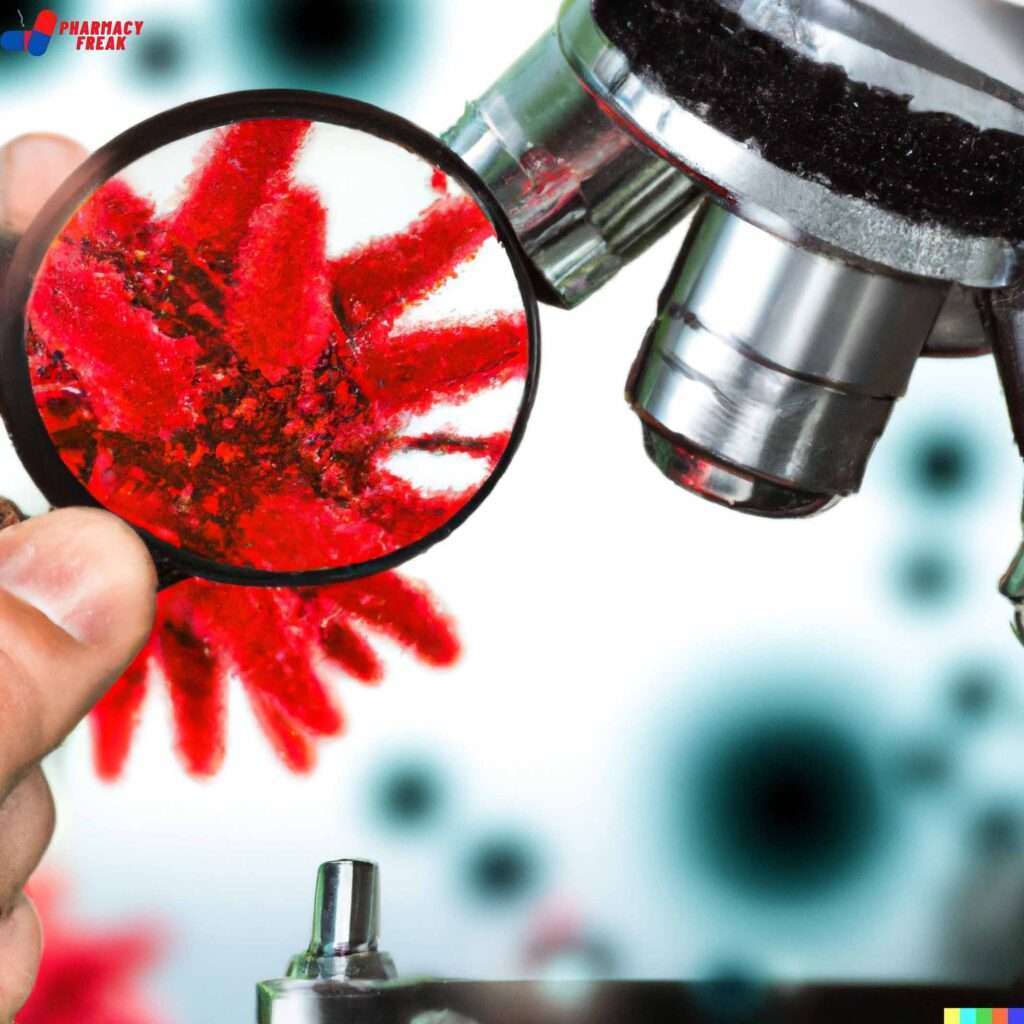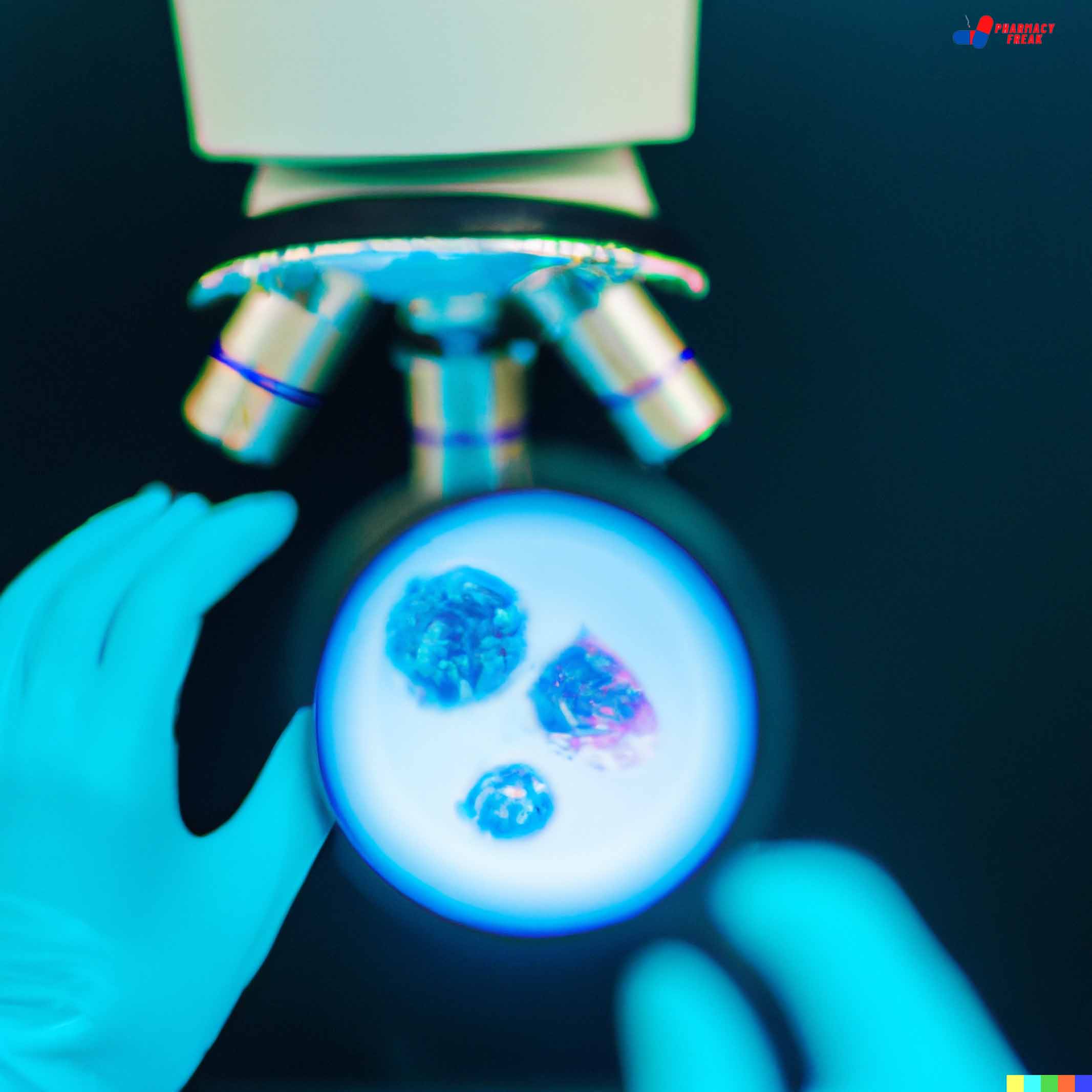Pharmaceutical microbiology plays an important role in ensuring the safety and efficacy of pharmaceutical products. It involves the study of microorganisms and their interactions with pharmaceuticals. The application of pharmaceutical microbiology extends to various areas, including drug development, production, and quality control. By understanding the scope and applications of pharmaceutical microbiology, we can better appreciate the importance of this field in the pharmaceutical industry. In this article, we will explore the different applications and scope of pharmaceutical microbiology in detail and cover the following Questions in details.
- Write the Applications and scope of pharmaceutical microbiology?
- Application of microbiology?
- Write in detail about scope and application of pharmaceutical microbiology?

Applications of pharmaceutical microbiology are:
- Production of antibiotics
- Production of enzymes, vaccines, biosurfactants, and other pharmaceutical products
- Diagnosis of diseases and treatment
- Treatment of industrial waste material
- Plant growth promotion
- Sterile product preparation
- Sterilization
- Steroid biotransformation
- Identification of microorganisms
- Testing of pharmaceuticals
Production of antibiotics
Pharmaceutical or industrial microbiology involves isolating antibiotic-producing microorganisms from natural environments like soil or water. The process of fermentation is used to isolate many antibiotics from natural microorganisms, such as Penicillin from Penicillium species, Streptomycin from Streptomyces griseus, Tetracycline from Streptomyces aureofaciens, and Chloramphenicol from Streptomyces venezuelae. The application of pharmaceutical microbiology plays an important role in identifying and isolating these microorganisms for the production of antibiotics.
Production of enzymes, vaccines, biosurfactants, and other pharmaceutical products
Pharmaceutical microbiology includes the detection and assay of pharmaceutical and chemical products resulting from microbial activity. Microbial cells have the ability to convert raw materials or substrates into valuable organic compounds, such as butanol, ethanol, and acetone. Enzymes produced by microbial cells, both intracellular and extracellular, play a crucial role in the success of pharmaceutical fermentation processes. These enzymes aid in the degradation and utilization of components in the medium, which leads to the accumulation of fermentation products like amylases, proteases, lipases, invertases, oxidase, catalase, cortisone reductase, phospholipases, cellulases, and chitinases.
Biosurfactants have various applications in industries such as agriculture, food, industrial cleaning, leather, paper and metal industries, textiles, cosmetics, and the pharmaceutical industry, are also produced by microbial cells. The application of pharmaceutical microbiology is essential in the detection, assessment, and utilization of these microbial activities and products.
Diagnosis of diseases and treatment
Different tests are used to detect infectious microorganisms e.g. EUSA, Widal test. Antimicrobial susceptibility testing is mainly used for selection of antibiotics for the treatment of microbial infections.
Treatment of industrial waste material
Industrial processes generate waste waters, salts, organic matter, and spent media, some of which can be toxic. Pharmaceutical microbiology involves the use of various microbial species like actinomycetes, fungi, and protozoa for decomposing such waste materials and organic components.
Anaerobic bacteria present in anaerobic digestion tanks are effective in breaking down organic matter into simple organic molecules, including acids, alcohols, glycerol, and amines. Streptomyces laveridulae is capable of degrading cyanide, which is produced on an industrial scale for use in metal extraction, electroplating, and the steel industry. The application of pharmaceutical microbiology plays an important role in utilizing microbial species for the efficient and sustainable degradation of industrial waste products.
Plant growth promotion
Microbial cells in soil enhance soil fertility, herbicidal and insect resistance, and plant product quality. Nitrogen-fixing microorganisms provide nitrogen for crop growth, and enzymes aid plant growth, seed germination, and fruiting. Soil microbial populations are vital for nutrient recycling and soil health. Beneficial rhizospheric bacteria, or plant growth-promoting rhizobacteria (PGPR), release growth-promoting substances.
Pseudomonas protects plants from soil-borne phytopathogens, and Azotobacter chroocogcum synthesizes and secretes plant growth-promoting substances, making it a common biofertilizer. The application of pharmaceutical microbiology is crucial in identifying and utilizing these beneficial microbes to enhance crop growth and improve soil health.
Sterile product preparation
Pharmaceutical microbiology is crucial in preparing sterile products. It involves preparing sterile rooms, using aseptic techniques, and detecting microbes through sampling and sterility testing of sterile preparations. Sterility testing is necessary for batch releases of sterile pharmaceuticals and medical devices. Different techniques such as settle plates, contact plates, and air sampling are used to detect microorganisms in sterile rooms.
Sterilization
One of the key applications of pharmaceutical microbiology is in the preparation of sterile pharmaceutical products. Sterilization methods are chosen based on the properties of the product and the types of microorganisms present.
To validate the effectiveness of the sterilization process, biological indicators containing bacterial spores are used as a challenge. These indicators can include Bacillus stearothermophilus for moist heat sterilization, Bacillus subtilis for dry heat sterilization, Bacillus pumilis for radiation sterilization, and Pseudomonas diminuta for membrane filtration. Proper sterilization is critical in ensuring the safety and efficacy of pharmaceutical products, and pharmaceutical microbiology plays a vital role in achieving this goal.
Steroid biotransformation
The application of pharmaceutical microbiology extends beyond sterilization and detection of microorganisms in pharmaceutical products. Microorganisms also play a significant role in the production of important pharmaceuticals. For instance, steroids like ergosterol, testosterone, and progesterone can be produced through microbiological transformations of naturally occurring steroids. These conversions are carried out by enzymes secreted by selected strains of microorganisms such as Streptomyces, Rhizopus, Aspergillus, and Penicillium species. This highlights the importance of microbiology in the development and production of pharmaceuticals.
Identification of microorganisms
Two vital functions of pharmaceutical microbiology and biotechnology are the enumeration and identification of microorganisms found in products and the manufacturing environment. There are many microbial cells present in the environment that are useful for the production of antibiotics, enzymes and other pharmaceutical substances. These microorganisms are isolated and identified by morphological, biochemical, cultural, microscopic characteristics and genetic studies. Testing of pharmaceuticals:
Testing of pharmaceuticals
a. Microbiological assays of antibiotics
Antibiotic bioassay determines the potency of an antibiotic preparation in terms of recognized international units. Agar diffusion and turbidometric assays compare the test antibiotic with a calibrated reference substance to estimate potency.
B. Evaluation of disinfectants
Various methods such as phenol coefficient test, cup plate method, turbidometric method, and Kelsey Sykes test are utilized to evaluate the effectiveness of different disinfectants used in cleaning and disinfection of manufacturing facilities for ensuring high quality standards of medicines and medical devices.
C. Antimicrobial preservative efficacy testing
Preservatives are added to products to prevent spoilage caused by microorganisms introduced during manufacturing or by the user. Various chemical substances are available for use in preservative systems, which should be non-toxic, widely available and exhibit broad spectrum activity. The effectiveness of preservatives can be determined through methods such as cup-plate, turbidometric, and total viable counting techniques.
D. Endotoxin testing
The bacteriel endotoxins test (BET) is crucial in quality control of parenterals and medical devices. Various methods like LAL test, gel-clot method, chromogenic end-point, kinetic turbidometric assay and kinetic chromogenic assay are used for endotoxin detection.
FAQs
What is pharmaceutical microbiology?
Ans- Pharmaceutical microbiology is a branch of microbiology that applies the principles of microbiology to the development and production of pharmaceutical products.
What are the applications of pharmaceutical microbiology?
Ans- Pharmaceutical microbiology has various applications in the pharmaceutical industry, including the development and testing of pharmaceutical products, quality control, and the identification of microorganisms that may cause contamination.
What are the key methods used in pharmaceutical microbiology?
Ans- The key methods used in pharmaceutical microbiology include microbial culture, microbial identification techniques, microbial enumeration, and microbial assay.
What is the importance of sterilization in pharmaceutical microbiology?
Sterilization is crucial in pharmaceutical microbiology as it is essential to ensure that the products are free from any harmful microorganisms that could potentially cause harm to patients.
What is endotoxin testing in pharmaceutical microbiology?
Ans- Endotoxin testing is a crucial part of pharmaceutical microbiology that involves the detection and measurement of endotoxins, which are harmful substances produced by some bacteria that can cause fever and other harmful effects in humans.
What are the different types of microbiological media used in pharmaceutical microbiology?
Ans- There are various types of microbiological media used in pharmaceutical microbiology, including agar plates, liquid media, and selective media. These media are used to culture microorganisms and facilitate their identification.
What is environmental monitoring in pharmaceutical microbiology?
Ans- Environmental monitoring is a process used in pharmaceutical microbiology to detect and control microbial contamination in the manufacturing environment. This is done to ensure the safety and efficacy of the final product.
What are the key regulatory requirements in pharmaceutical microbiology?
Ans- Regulatory requirements in pharmaceutical microbiology include compliance with good manufacturing practices (GMP) and various guidelines issued by regulatory bodies such as the FDA and EMA. These requirements ensure that pharmaceutical products are safe and effective for use.
Why is pharmaceutical microbiology important in the pharmaceutical industry?
Ans- Pharmaceutical microbiology is important in the pharmaceutical industry because it helps ensure the safety and efficacy of pharmaceutical products by identifying and controlling microorganisms that may cause contamination or spoilage.
What are the applications of pharmaceutical microbiology?
Ans -The applications of pharmaceutical microbiology include quality control of raw materials, production environments, and finished products; development of new antimicrobial agents; and identification of microorganisms causing infections and diseases.
How is pharmaceutical microbiology involved in the production of antibiotics?
Ans-Pharmaceutical microbiology is involved in the production of antibiotics by identifying and selecting microorganisms that produce the desired antibiotic compounds, optimizing growth conditions, and scaling up production.
What other pharmaceutical products can be produced using pharmaceutical microbiology?
Ans- Other pharmaceutical products that can be produced using pharmaceutical microbiology include vaccines, probiotics, and enzyme preparations.
How does pharmaceutical microbiology aid in the diagnosis and treatment of diseases?
Ans-Pharmaceutical microbiology aids in the diagnosis and treatment of diseases by identifying the causative microorganisms, determining their susceptibility to antibiotics, and developing appropriate treatment strategies.
What is the role of pharmaceutical microbiology in the treatment of industrial waste material?
Ans- Pharmaceutical microbiology plays a role in treating industrial waste material by identifying and selecting microorganisms that can degrade or detoxify harmful compounds in the waste.
How does pharmaceutical microbiology enhance plant growth?
Ans- Pharmaceutical microbiology enhances plant growth by developing microbial inoculants that promote plant growth and health.
What is the role of pharmaceutical microbiology in preparing sterile products?
Ans-Pharmaceutical microbiology plays a crucial role in preparing sterile products by ensuring the sterility of raw materials, production equipment, and finished products.
Why is sterilization important in the pharmaceutical industry and how does pharmaceutical microbiology play a role in it?
Ans-Sterilization is important in the pharmaceutical industry to prevent contamination and ensure product safety, and pharmaceutical microbiology plays a role in validating and monitoring sterilization processes.

I am a Registered Pharmacist under the Pharmacy Act, 1948, and the founder of PharmacyFreak.com. I hold a Bachelor of Pharmacy degree from Rungta College of Pharmaceutical Science and Research. With a strong academic foundation and practical knowledge, I am committed to providing accurate, easy-to-understand content to support pharmacy students and professionals. My aim is to make complex pharmaceutical concepts accessible and useful for real-world application.
Mail- Sachin@pharmacyfreak.com
